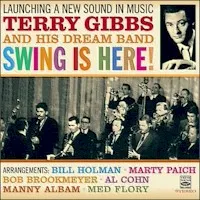Styles: Trumpet Jazz
Year: 2010
File: MP3@320K/s
Time: 55:42
Size: 129,4 MB
Art: Front
( 3:25) 1. The Elephant Wail
( 1:40) 2. Los Barbaros
( 3:05) 3. Paradise Found
( 1:55) 4. Trapped
( 2:14) 5. Los Primitivos
( 3:24) 6. Oomgawa
(17:33) 7. Tarzanic Suite
( 3:19) 8. Mountain Greenery
( 4:57) 9. Martian Lullaby
( 4:08) 10. Bluesies
( 2:16) 11. Big Band Blues
( 1:15) 12. I Want To Be Happy
( 6:26) 13. The Three Little Bops
You Shorty, Me Tarzan!
Year: 2010
File: MP3@320K/s
Time: 55:42
Size: 129,4 MB
Art: Front
( 3:25) 1. The Elephant Wail
( 1:40) 2. Los Barbaros
( 3:05) 3. Paradise Found
( 1:55) 4. Trapped
( 2:14) 5. Los Primitivos
( 3:24) 6. Oomgawa
(17:33) 7. Tarzanic Suite
( 3:19) 8. Mountain Greenery
( 4:57) 9. Martian Lullaby
( 4:08) 10. Bluesies
( 2:16) 11. Big Band Blues
( 1:15) 12. I Want To Be Happy
( 6:26) 13. The Three Little Bops
2010 release, the fourth installment in the Giant Steps label's series of classic recordings by legendary modernists Shorty Rogers & the Giants. Assembled is the rare percussive soundtrack to Tarzan the Ape Man that featured the likes of Bud Shank, Bob Cooper, Frank Rosolino and other famed West Coasters. Said Shorty: "At first, I was slightly apprehensive when MGM approached me to write and record the soundtrack for a Tarzan movie, but I needn't have concerned myself. They just said, make it exciting with plenty of drumming, and left me alone to get on with it. So I approached it as if I was really making a new Giants album, which is what it really was. I don't want to sound discourteous, but the album we made was much better that the actual movie". Also included is an equally rare 'live' appearance by the Big Band version of the Giants from an appearance on the TV show the Stars of Jazz. Giant Steps. ~Editorial Reviews https://www.amazon.com/You-Shorty-Tarzan-Rogers-Giants/dp/B0032BVEIG
Personnel: Trumpet, Conductor, Composed By – Shorty Rogers ; Bass – Buddy Clark, Joe Mondragon ; Drums – Carlos Rosario, Chach Gonzales, Chico Guerrero, Frank Capp, Modesto Duran ; Piano – Pete Jolly ; Saxophone – Bill Holman, Bill Hood, Bill Perkins, Bob Cooper, Bud Shank, Chuck Gentry; Trombone – Bob Enevoldsen, Frank Rosolino, Harry Betts, Marshall Cram; Trumpet – Al Porcino, Buddy Childers, Don Fagerquist, Ollie Mitchell
Personnel: Trumpet, Conductor, Composed By – Shorty Rogers ; Bass – Buddy Clark, Joe Mondragon ; Drums – Carlos Rosario, Chach Gonzales, Chico Guerrero, Frank Capp, Modesto Duran ; Piano – Pete Jolly ; Saxophone – Bill Holman, Bill Hood, Bill Perkins, Bob Cooper, Bud Shank, Chuck Gentry; Trombone – Bob Enevoldsen, Frank Rosolino, Harry Betts, Marshall Cram; Trumpet – Al Porcino, Buddy Childers, Don Fagerquist, Ollie Mitchell
You Shorty, Me Tarzan!




















